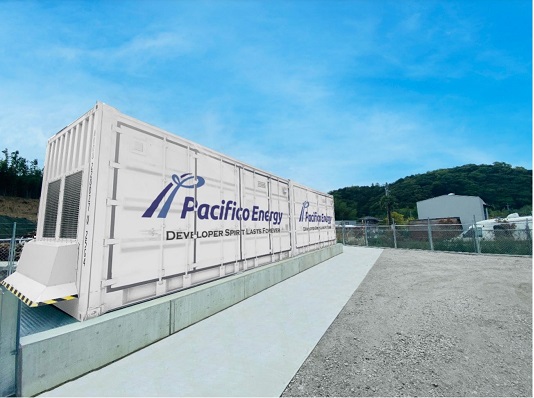Singapore-headquartered renewable energy company Gurin Energy has revealed plans for a 500MW, 4-hour duration (2,000MWh) battery storage project in Japan.
It’s the biggest battery energy storage system (BESS) asset announced in the country to date, although it will be a while before it comes online – Gurin Energy said the project’s development will take about six years and the company is expecting construction to begin in 2026.

Gurin will build and operate the plant, using lithium iron phosphate (LFP) lithium-ion (Li-ion) batteries. The BESS equipment will be supplied by Japan’s Toshiba Mitsubishi – Electric Industrial Systems Corporation (TMEIC), while engineering consulting services by another Japanese company, Nippon Koei Energy Solutions.
Marking Gurin Energy’s entry into Japan, the announcement made on Friday (15 December) comes amid promising signs of life for the Asian country’s grid-scale BESS market, which has lagged in pace of development behind more mature markets like the UK, US or neighbours China and South Korea.
The developer is setting up an office in Tokyo. It hasn’t yet selected a site for its 2GWh BESS, but said it is “considering a number of locations” in either Fukushima prefecture or Tochigi prefecture, both a few hours drive directly north of the capital city.
Energy-Storage.news has sent the developer a few questions about the drivers behind the project and its Japan market entry, and hopes to update this story in due course upon receiving replies.
Japan is targeting renewables to make up 36% to 38% of its electricity generation mix by 2030, reduce emissions by 46% by that time and achieve carbon neutrality by 2050. As Gurin Energy pointed out in a release, this has been modelled to require about 10GW of energy storage by the end of this decade.
At the moment, revenue streams available to battery storage are relatively limited but are opening up through technology advances as well as policy and regulatory progress. For instance, large-scale grid-connected BESS has recently become eligible to participate in buying and selling wholesale electricity in the spot market on the Japan Electric Power Exchange (JEPX).
Next year, ancillary services market opportunities are expected to open up, as is a new capacity market structure open to low carbon resources.
These big picture drivers have led to developments including the recent launch of Japan’s first-ever fund dedicated to investing in front-of-the-meter BESS, set to be co-managed by Gore Street Capital, which founded one of the UK’s first funds of that type.
Just a few days ago, US vehicle-to-grid (V2G) technology specialist Nuvve announced that it had been selected to manage 30MWh of stationary battery storage assets in Japan. One thing Nuvve and Gore Street have in common is that they will both be partnered with major Japanese corporate players.
This has traditionally been seen as key to successful market entry in Japanese industry, and energy storage is no exception. Gore Street’s Japanese fund co-manager Itochu Corporation has also formed a partnership to develop projects in the country with Akaysha Energy, the Australian energy storage developer backed by Blackrock.
Trina Storage makes first Japan deal
Chinese solar PV and battery manufacturers have also been ramping up their interest in Japan recently, with battery maker CATL this summer ordering a BESS solution from Hitachi Energy for a large-scale project, and PV manufacturer Jinko Solar receiving orders for a handful of megawatt-scale projects a few weeks ago.
Adding to that list, which also includes Sungrow and other well-known solar companies, is Trina Solar’s energy storage division Trina Storage. Trina Solar is one of the elite Solar Module Super League (SMSL) PV manufacturers as ranked by our colleagues at PV Tech.
Trina Storage launched a couple of years ago and has to date delivered projects in its Chinese homeland and in the UK’s booming BESS market, launching its own-brand liquid cooled LFP BESS solution, Elementa 2, which will use the manufacturer’s own cells.
Trina Storage said last week (13 December) that it was able to publicly announce its first large-scale BESS deal in Japan, which was signed in late November.
The company signed a Memorandum of Understanding (MoU) to supply 30MWh of battery storage to forestry company Narashinrinsigen Hozenkousya (Nara Forest Resources Conservation Corporation) in the historic region of Nara.
Equipment will be supplied beginning next year. A Trina Storage representative told Energy-Storage.news that the 30MWh deal comprises a number of separate systems, but could not go into specifics. The spokeperson said the systems will perform a combination of both behind-the-meter (BTM) applications for its client, as well as front-of-the-meter (FTM) applications for the grid.
Trina has been present in the Japanese market as a solar PV solutions provider for more than 13 years, targeting residential, commercial and utility-scale markets.
Energy-Storage.news’ publisher Solar Media will host the 2nd Energy Storage Summit Asia, 9-10 July 2024 in Singapore. The event will help give clarity on this nascent, yet quickly growing market, bringing together a community of credible independent generators, policymakers, banks, funds, off-takers and technology providers. For more information, go to the website.

 Tiếng Việt
Tiếng Việt